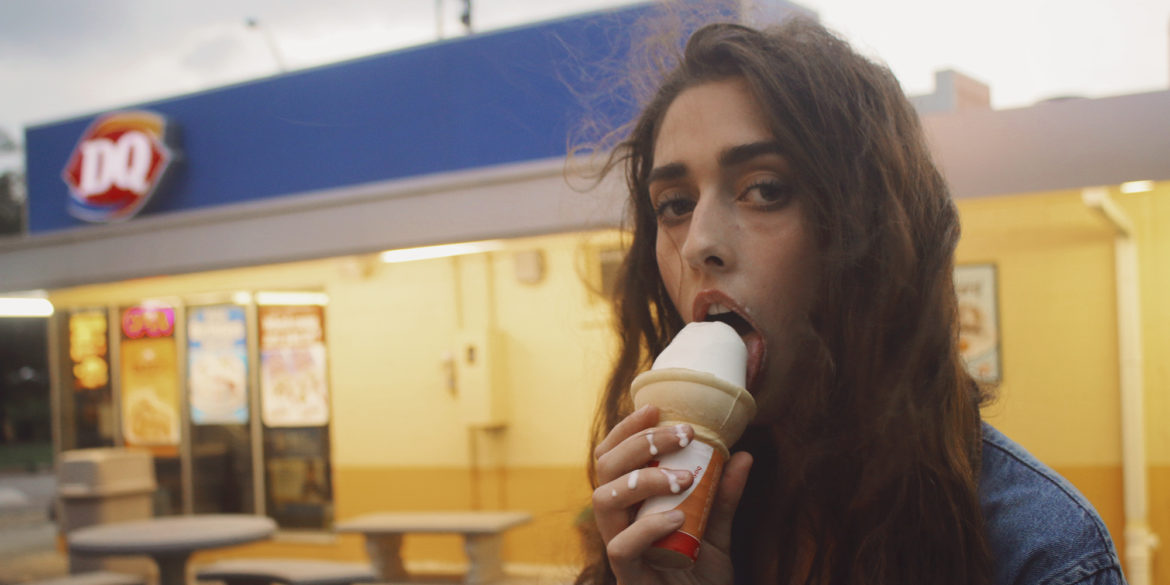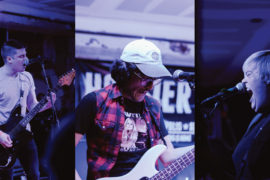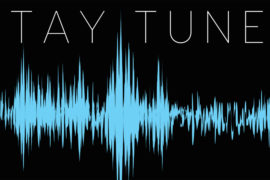Coyote Talk is an alt-Americana duo from Nashville with roots in Indiana. They are influenced by “everything from the Beach boys to Gene Autry, by way of Fleetwood Mac” and played at the White Rabbit in Indianapolis this weekend. Having recently released their sophomore release, Shangri-La, on March 31st, they are playing a show next week in Nashville as well as a house show tour with Joel Levi later this summer. PATTERN chatted with members Josh Frigo (Vox/Guitars) and Alex Dobbert (Drums) about their album release, playing in the Midwest, and plans for the future.
Corey Regan: Your new album came out today. It’s named Shangri-La, after the mythical Eastern paradise. How did you come up with that title?
Alex Dobbert: Yeah, well, I was, uh, I was a little tipsy one night and doing what I do when that happens and so I was, uh, you know… looking through my history books [laughs], and I read that FDR originally named Camp David, Shangri-La before it was Camp David. So I thought it was really interesting — this idea that you could escape to this sort of mythical place or find that spot for you on Earth. So the song is about how you think you’re going to find that and then you find out it ain’t all it’s cracked up to be.
Josh Frigo: So Alex read this, drunk texted me with it, and I thought it was awesome. What really struck me was that Shangri-La comes from the novel Lost Horizon. It’s this mythical paradise.
CR: There’s a movie about it, too.
JF: Yeah! Over the years it becomes transformed into a way for seedy motels and day spas to add an air of luxury, so it’s like kind of become a cheap symbol of capitalism. I liked that transformation over time. I don’t mean that either in a pessimistic or nihilistic way, but sometimes things turn out different than you expect. The record is about growing up, and with growing up, things don’t always turn out how you expect. But the best you can do is take what you’re given and run with it.
CR: I really like the cover art you chose. Is that someone you know? Who is that a photo of?
JF: The photo is of my fiancé, Logan Dodd. It was designed by Brothers Design Co., Juan and Sam Solorzano out in Nashville, Tennessee. They are two amazing design guys and have done a handful of really great records. They did the Midwest Farmer’s Daughter record cover this last year…
AD: Caleb Growe…
JF: Caleb Growe’s record cover, both talented artist and musicians in their own right and also have a really great eye.
CR: You’re technically a Nashville band, but you met at Ball State in Muncie, Indiana. Which do you associate with more when people ask where you’re from?
JF: We say we come from the Indy scene. That’s where we grew up. Our hometown crowd is here. So we have been really fortunate and blessed to have a great reception here. We also love living in Nashville. We work out of there, and I’m there because I’m a writer and I tour for other people. There isn’t the industry here in Indy if you want to be a touring utility player like you can in Nashville. But certainly, as Coyote Talk, the hometown crowd is Indianapolis.
AD: And I think there’s a little bit of the Midwest in our sound, too. You can hear that Heartland sound.
JF: You can hear Tom Petty, you can hear…
CR: I was about to ask you about that. You seem to associate a lot with Midwest from your lyrics and from how you describe yourself online. How do you think the spirit of the Midwest shapes your sound?
JF: There is a sort of humor and a way of not taking yourself too seriously, that’s very Midwestern. A little bit self-deprecating, but also being super serious, and coming from a very religious part of the state, a very ideologically conservative state. There’s this strange balance, a yin and yang, to being a Midwesterner. We really love tension in our music, and so that kind of conflict there expresses itself in our music.
AD: Yeah, we make driving albums — records that you can put on and escape a little bit while you’re driving through the cornfields.
 CR: Your new album opens up with a cool interplay of vocal harmonies. It seems a lot more produced than your previous release, Sister. Did you go in recording it with a specific, concrete idea of what sound you wanted?
CR: Your new album opens up with a cool interplay of vocal harmonies. It seems a lot more produced than your previous release, Sister. Did you go in recording it with a specific, concrete idea of what sound you wanted?
JF: We had a lot of influences that we wanted to incorporate. We produced the whole record ourselves. I wrote everything, Alex engineered and mixed it, and Mark, who is playing bass tonight, played bass on the record. Alex played drums on the whole thing, Adam, who plays guitar, put a guitar down on a track, and then we played everything else essentially, with the exception of some pedal steel on Angelino. Harrison Yount, who is formerly Kacey Musgraves’ steel player, came in and put some pedal steel down. I was really infatuated with ’50s era Nashville country, which was like Gene Autry. It’s very produced, sort of cartoonish and ridiculous, but I found something kind of sweet about it. Our goal was to take that big production and to meld it with the psych pop of the ’60s Beach Boys. It took many, many attempts. I think we recorded this record three times.
AD: Yeah because it did not want to go. [laughs]
JF: It was a struggle.
AD: We pushed that square right through that circle. [laughs]
JF: Yeah, we did. [laughs]
CR: Listening to your record, I found some similarities to groups like The Head and the Heart or The War On Drugs. What would you consider to be your biggest influences?
JF: For what Coyote Talk sounds like, My Morning Jacket is a great approximation. The other day, Mark said we sound like if Dawes and Sufjan Stevens had a baby.
CR: Dawes just played here recently.
AD: They’re great.
JF: Yeah, they’re amazing. It’s like Heartland rock, but there’s some weird stuff in there. And then influence-wise…
AD: All over the map. For me, The Beatles are number one.
JF: I couldn’t put a finger on one thing. There’s too much.
CR: In your album, you sing about ‘kicking it with the death metal junkies,’ which is a style that’s a little different from what you guys play…
JF: [laughs] We’re considering taking a turn for the next record.
CR: Are you guys pretty diverse in your own musical tastes?
AD: Well we both came up playing in metalcore. At the time it was called hardcore.
CR: Very Midwestern.
JF: I grew up 45 minutes southeast of Chicago, and there was only a hardcore scene. If you wanted to play music, you were in a hardcore band. So that song’s just about trying to remember that period fondly.
CR: How do you envision your band growing from here? Do you feel like you’ve settled into a style that you want to stick with, or do you plan on evolving and experimenting with in the future?
JF: For me, I never want to make the same record twice, but I really like what we’ve struck on this record, so I think that we’ll continue to dive deeper again on the next one. But we’d love to keep connecting with people and sharing music and expanding our reach beyond Nashville, Indy, and Chicago which are our main hubs right now.
CR: How would you describe your songwriting process? Do you mostly start on guitar or…
JF: Fucking hard and long. A song called ‘Sully’ that’s on the record took two years to write. I like to call the way I approach stuff as puzzle making. I get a piece of something, and I try and stick another piece to it. With ‘Sully’, I had a chord progression, and I could not make anything happen. Two years later, I had a lyrical idea, and then we finally put in production.
CR: If you could recommend any songs of yours to start with for new listeners, what would you recommend?
JF: From the new record I would start with ‘Spirit of the Night’. I think it’s a great intro to the record.
AD: Yeah, ‘Spirit of the Night’, ‘Stuck Inside a Cloud’, and ‘All We Have’ are three really great representations of who we are. They’re also some of my favorite songs.
JF: And also ‘Death Metal Junkies’, and ‘Shangri-La’. And older stuff, like ‘No Man’s Land’, ‘Glory Bones’ and ‘American Soul’ from the last record.




